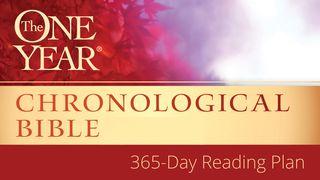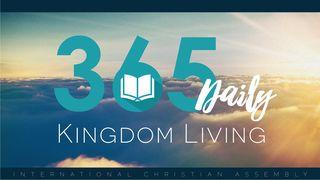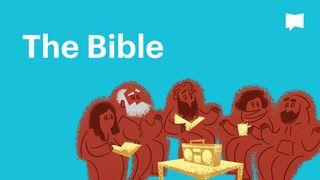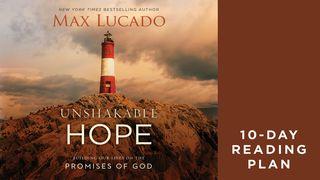The Bible with Nicky and Pippa Gumbel, Classic Version, 2017Sample

Rich in Mercy
A man was having his portrait painted by a successful artist. When the portrait was finished it was unveiled. The man was most unhappy with the result. When asked whether he liked it, he replied, ‘I don’t think it does me justice.’ To which the artist replied, ‘Sir, it is not justice you need, but mercy!’
At the end of the day we all need mercy even more than justice. The theme of the ‘mercy of God’ runs throughout the Bible. God is ‘rich in mercy’ (Ephesians 2:4). The Greek word ‘eleos’ means ‘mercy, compassion, pity, clemency’. The mercy of God is available for you. In our passages for today we see some examples of people who are recipients of God’s mercy.
Psalm 27:7-14
1. The struggling
No matter what struggles you are facing in your life, hold on to God’s promises. Expect to see God’s goodness, not just in heaven when you die, but in the ordinary activities of your life here on earth (‘in the land of the living’, v.13).
David cries out to God, ‘Be merciful to me’ (v.7b). Being falsely accused is a horrible experience. David faces ‘oppressors’ (v.11b) and ‘false witnesses’ (v.12b). Going through this very painful experience he cries out to God for mercy, and in the middle of all the accusations he is able to say, ‘I remain confident of this: I will see the goodness of the Lord in the land of the living’ (v.13).
The reason that David has this confidence is because he recognises that God is his Saviour (v.9b) and a perfect parent. ‘Though my father and mother forsake me, the Lord will receive me’ (v.10).
Many people today struggle as a result of a lack of love from their parents. But whatever your relationship with your parents, you can still begin to picture what a relationship with a perfect parent would look like.
God is such a parent. His faithfulness is without question. His generosity is perfect. His affection is tender and loving. His presence is permanent. His acceptance of you is unconditional. His communication is up-building and for your best interest. His authority is right and true.
When David writes that ‘the Lord will receive me’ (v.10b), he is thinking of those kinds of perfect parental attributes.
God is not going to fail you, especially when you are struggling. Some earthly parents only provide love and protection when they feel their children deserve it. Not God. The amazing truth is that our Father is merciful and gives us love and protection, even when we don’t deserve it.
‘Hear my voice when I call, Lord; be merciful to me and answer me. My heart says of you, “Seek his face!” Your face, Lord, I will seek… Teach me your way, Lord’ (vv.7–8,11).
Mark 10:13-31
2. The children
In a society that did not hold ‘little children’ (v.13) in high regard, Jesus had compassion on them (vv.13–16). He said, ‘The kingdom of God belongs to such as these’ (v.14b). He took them ‘in his arms, put his hands on them and blessed them’ (v.16). We must make sure that as a church community we give children the same love, protection and priority that Jesus gave them – in terms of time, energy and resource.
In fact, Jesus tells us, whoever we are, however old we are, we all need to learn from children when it comes to being a part of the kingdom of God: ‘I tell you the truth, anyone who will not receive the kingdom of God like a little child will never enter it’ (v.15).
Jesus is not suggesting that we become like children in every aspect. We are not to give in to every childish whim or assume no responsibility for our actions. But, like children, we are to be open and receptive, to be honest about our feelings – acknowledging how fragile and vulnerable we are and how much we need others. Like children, be quick to forgive and quick to move on in trust.
Children are usually enthusiastic, appreciative and excited when given gifts. When it comes to God’s kingdom, we are to be exactly the same – dependent on Jesus’ gift to us and ready to accept it as a gift which we do not deserve, but which Jesus, in his mercy, offers to us.
Lord, help me to learn from children, to become like them in the right ways and to give them the same priority that you give them.
3. The poor
Jesus tells the rich young man to ‘give to the poor’ (v.21b). This surely is not just for his own benefit but because the poor were another high priority in Jesus’ life and ministry.
Lord, help me to have the same love and compassion for the poor as you do.
4. The rich
The compassion of Jesus reached not just the poor but also the rich. Jesus looked at this rich young man and ‘loved him’ (v.21a). It is extremely hard for the rich to enter the kingdom of God (vv.24–25).
Rich people and even rich nations are sometimes more resistant to the gospel. Wealth can lead to arrogance and a wrong kind of self-reliance. Yet Jesus says it is not impossible for the rich to be saved: ‘All things are possible with God’ (v.27).
Lord, thank you that you are so merciful – not only to the poor but also to the rich.
5. The persecuted
Jesus says that all his followers will be persecuted (v.30). For some of us the ‘persecutions’ are very minor and trivial. People may laugh at you, ridicule you and oppose you. However, for millions of Christians around the world the persecutions are very real and physical.
This is part of the cost to following Jesus – persecution. There is always a cost to following Jesus. It may be that we lose friends or that Jesus calls us to leave a situation or a relationship. But the cost comes in a sandwich of blessing – in this life there is a hundredfold return (vv.29–30), ‘and then the bonus of eternal life!’ (v.30, MSG). God will be merciful to the persecuted.
Lord, thank you for the courage, example and inspiration of those who bear real hardship for you. Give me boldness to follow you whatever the cost.
Leviticus 4:1-5:13
6. The guilty
We are all guilty of sin (James 2:10). The word ‘guilt’ appears over and over again in this passage (Leviticus 4:3,13,22,27; 5:2,3,4,5). There is a penalty for sin (5:5–6). The apostle Paul tells us that the penalty for sin is death (Romans 6:23).
The elaborate sacrifices described in this passage were preparing the people for the one perfect sacrifice of Jesus who died for you and me (the guilty) so that we might receive the mercy of God.
- Jesus made atonement for your sins
Forgiveness does not come without atonement for sin (Leviticus 4:31,35; 5:10,13). One definition of atonement is ‘the action of making amends for a wrong or injury that brings two parties together as one’ – hence the word ‘at-one-ment’. Ultimately, it is only Jesus who made the perfect atonement for our sins (Hebrews 2:17).
- Jesus died as a sacrifice of atonement
We read here of the elaborate sacrificial system of ‘sin offerings’ (Leviticus 4:3,29,33,34; 5:9,11,12). Jesus died as the ‘sacrifice of atonement’ (Romans 3:25) for your sin and mine.
- Jesus was the perfect sacrifice
The sacrifice had to be ‘without defect’ (Leviticus 4:3,28,32). Ultimately, it was only Jesus who could be the perfect sacrifice (Hebrews 5:9).
- Jesus is the Lamb of God
A lamb was brought as a sin offering (Leviticus 4:32). The guilty person had to lay their hands on its head. The lamb died as a sin offering to take away sin. Jesus is ‘The Lamb of God, who takes away the sin of the world!’ (John 1:29).
- Jesus’ blood was shed for you
The priest had to take some of ‘the blood of the sin offering... and pour out the rest of the blood’ (Leviticus 4:34). The blood represented the life of the animal (17:11). Pouring out the blood was symbolic of the fact that the animal had died. This was in the place of the person making the sacrifice. The blood of Jesus was poured out for you and me (Matthew 26:28).
- Jesus has made God’s mercy available to all
The words ‘forgiveness’ and ‘forgiven’ are words that appear over and over again (Leviticus 4:20,26,31,35; 5:10,13). ‘Without the shedding of blood there is no forgiveness’ (Hebrews 9:22). Through Jesus’ blood, forgiveness of sins is possible (Ephesians 1:7). As a result, God’s mercy is available for you and me.
Lord, thank you so much that I no longer have to go through these elaborate processes to obtain mercy and forgiveness. Thank you that total forgiveness is available for me through Jesus. Thank you that in your great love for me you are ‘rich in mercy’ (2:4).
Pippa Adds
Leviticus 4:1–5:13
Oh dear, all those sacrifices. What a messy, complicated way to be forgiven. It is so wonderful that we can go quietly and humbly to Jesus, ask to be forgiven and be cleansed from all our sins. How amazing is that!
About this Plan

Start your day with the Bible in One Year, a Bible reading app with commentary by Nicky and Pippa Gumbel. Nicky Gumbel is the Vicar of HTB in London and pioneer of Alpha. 'My favourite way to start the day.' - Bear Grylls, Adventurer
More
We would like to thank Nicky and Pippa Gumbel, HTB for providing this plan. For more information, please visit: https://www.bibleinoneyear.org/
Related Plans

The One Year® Chronological Bible

ICA - 365 Daily Kingdom Living

The Greatest Gift

C.S. Lewis And The Call To Create

BibleProject | The Bible

Choosing Each Day: God or Self?

Discerning The Voice Of God

Through My Father's Eyes

Unshakable Hope: Building Our Lives On The Promises Of God
